
Low-alcohol beer is beer with little or no alcohol content and aims to reproduce the taste of beer while either eliminating the inebriating effects of standard alcoholic brews, or carbohydrates, and thus calories, typically at the expense of alcohol. Most low-alcohol beers are lagers, but there are some low-alcohol ales. Low-alcohol beer is also known as light beer, non-alcoholic beer, small beer, small ale, or near-beer.

Craft beer is a beer that has been made by craft breweries. They produce smaller amounts of beer, typically less than large breweries, and are often independently owned. Such breweries are generally perceived and marketed as having an emphasis on enthusiasm, new flavours, and varied brewing techniques.

The Liquor Control Board of Ontario (LCBO) is a Crown corporation that retails and distributes alcoholic beverages throughout the Canadian province of Ontario. It is accountable to the Legislative Assembly through the minister of finance. It was established in 1927 by the government of Premier George Howard Ferguson to sell liquor, wine, and beer. Such sales were banned outright in 1916 as part of prohibition in Canada. The creation of the LCBO marked an easing of the province's temperance regime. By September 2017, the LCBO was operating 651 liquor stores.
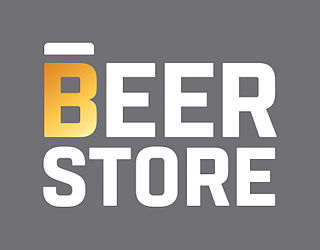
Brewers Retail Inc., doing business as The Beer Store, is a privately owned chain of retail outlets selling beer and other malt beverages in the province of Ontario, Canada.

Sleeman Breweries is a Japanese-owned Canadian brewery founded by John Warren Sleeman in 1988 in Guelph, Ontario. The company is the third-largest brewing company in Canada. Along with its own Sleeman brands, the company produces under licence the Stroh's family of brands, Maclays Ale and Sapporo Premium beers for sale in Canada. The company's parent Sapporo owns 4.2 per cent of Ontario's primary beer retailer The Beer Store.

In the United Kingdom, a tied house is a public house required to buy at least some of its beer from a particular brewery or pub company. That is in contrast to a free house, which is able to choose the beers it stocks freely.

Beer was introduced to Canada by European settlers in the seventeenth century. The first commercial brewery was La Brasseries du Roy started by New France Intendant Jean Talon, in Québec City in 1668. Many commercial brewers thrived until prohibition in Canada. The provincial and federal governments' attempt to eliminate "intoxicating" beverages led to the closing of nearly three quarters of breweries between 1878 and 1928. It was only in the second half of the twentieth century that a significant number of new breweries opened up. The Canadian beer industry now plays an important role in Canadian identity, although globalization of the brewing industry has seen the major players in Canada acquired by or merged with foreign companies, notably its three largest beer producers: Labatt, Molson and Sleeman. The result is that Moosehead, with an estimated 3.8 percent share of the domestic market in 2016, has become the largest fully Canadian-owned brewer.

Beer is manufactured by more than 7,000 breweries in the United States, which range in size from industry giants to brew pubs and microbreweries. The United States produced 196 million barrels (23.0 GL) of beer in 2012, and consumes roughly 28 US gallons (110 L) of beer per capita annually. In 2011, the United States was ranked fifteenth in the world in per capita consumption, while total consumption was second only to China.
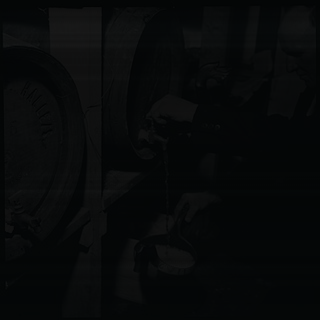
Beer in Norway has a long history, stretching back more than a millennium. Until some 200 years ago, most farms where it was possible to grow grain south of the Arctic Circle, brewed their own beer. From the early 20th century brewing was industrialized and home brewing was restricted. Significant consolidation in the brewing sector reduced the number of major breweries to just a handful. With the exception of the farmhouse ales, most beer styles brewed in Norway trace their ancestry to central Europe.
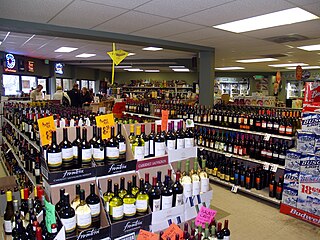
A liquor store is a retail business that predominantly sells prepackaged liquors, wine or beer, usually intended to be consumed off the store's premises. Depending on region and local idiom, they may also be called an off-licence, off-sale, bottle shop, bottle store or, colloquially, bottle-o, liquor store or other similar terms. A very limited number of jurisdictions have an alcohol monopoly. In US states that are alcoholic beverage control (ABC) states, the term ABC store may be used.
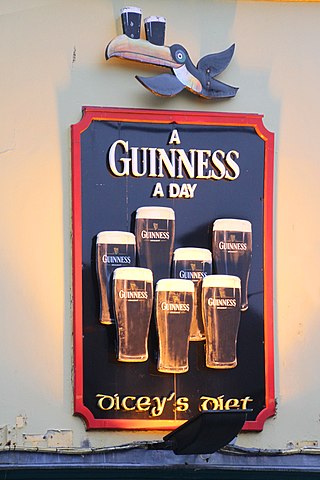
Brewing in Ireland has a long history. Production currently stands at over 8 million hectolitres, and approximately half the alcohol consumed is beer.

Beer in Japan mostly comes from the country's four major breweries, Asahi, Kirin, Sapporo and Suntory, which mainly produce pale lagers around 5% ABV. Beer is immensely popular, far ahead of sake consumption.
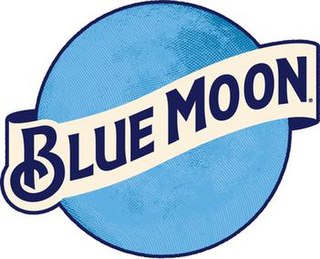
Blue Moon Belgian White is a Belgian-style witbier brewed by Molson Coors under the name the Blue Moon Brewing Co. It was launched in 1995, and was originally brewed in Golden, Colorado.

The Alberta Gaming, Liquor and Cannabis Commission (AGLC) is an agency of the government of the Canadian province of Alberta, and regulates alcoholic beverages, recreational cannabis, and gaming-related activities. References to cannabis were added to AGLC's name and governing legislation as cannabis in Canada moved towards legalization in 2018. AGLC was created in 1996 as the Alberta Gaming and Liquor Commission by combining the responsibilities and operations of the Alberta Liquor Control Board (ALCB), Alberta Lotteries, the Alberta Gaming Commission, Alberta Lotteries and Gaming and the Gaming Control Branch. The current Chief Executive Officer as of 2020 is Kandice Machado.
The Washington State Liquor and Cannabis Board, formerly the Washington State Liquor Control Board, is an administrative agency of the State of Washington. The Liquor and Cannabis Board is part of the executive branch and reports to the Governor. The board's primary function is the licensing of on and off premises establishments which sell any type of alcohol, and the enforcement and education of the state's alcohol, tobacco, and cannabis laws.
The Liquor Licence Act of Ontario is a provincial act in Ontario dealing with licensing and possession of alcohol. In most cases, the Act impacts eateries requiring a licence to serve alcohol.

The Agassiz Brewing Company was a Canadian brewery, founded by former Fort Garry Brewing Company brewmaster Gary De Pape. The company was established in 1998 in Winnipeg, Manitoba and based there until 2010. It was named for the prehistoric glacial Lake Agassiz which once covered much of Manitoba. Agassiz beer was available in Manitoba, Saskatchewan, Ontario, and British Columbia.

Oklahoma allows any establishment with a beer and wine license to sell beer and wine up to 15% ABV, under refrigeration.
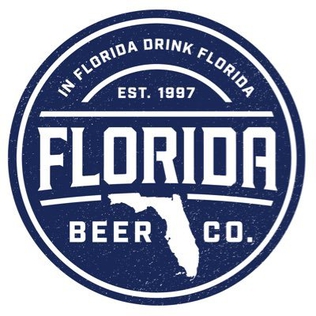
Florida Beer Company is a brewery in Cape Canaveral, Florida.
Buck-a-beer was a campaign slogan used by the Progressive Conservative Party of Ontario, led by Doug Ford, during the 2018 Ontario general election. The party pledged to lower liquor pricing in the province, reducing the minimum price of beer from $1.25 to $1. Once implemented, however, the program saw low adoption by breweries and resellers.
















